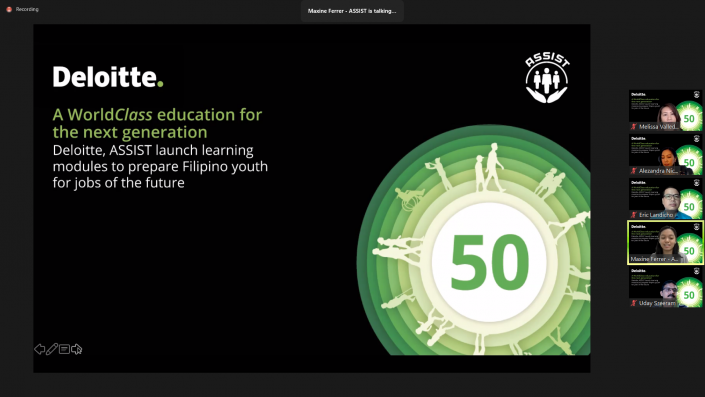
Deloitte Philippines and the Asia Society for Social Improvement and Sustainable Transformation (ASSIST) held a virtual roundtable last November 19 to discuss their goal of educating 380,000 Filipinos by 2030 through their WorldClass program.
The initiative was previously launched by consultancy firm Deloitte, in partnership with non-government organization ASSIST, to provide free video learning modules focusing on topics such as cloud computing, mobile development, business continuity management systems (BCMS), and cybersecurity.
ICT strengthening
Sreeni Narayanan, founder and Managing Director of ASSIST, shared that the program began in June of this year as a response to the sudden need for the Filipino youth to adapt to the new normal and the jobs of the future.
“This launch is really the first step in a long journey,” he explained, further adding that they will spend the next decade to enhance the skills of young Filipinos on topics that are made “even more relevant” by the pandemic.
Meanwhile, Atty. Fredieric Landicho, Managing Partner & CEO of Deloitte Philippines, said that they aim to mold students into “smarter and more responsible digital users” by teaching them topics in cybersecurity, while lessons on BCMS would allow them to understand that “there is a method to prepare for a crisis, such as the pandemic that we are experiencing right now.”
Landicho also noted that these systems are not just beneficial to businesses; local government units, too, can learn from these BCMS modules.
These modules were rolled out initially to the public academic institutions they have partnered with, namely Jose Rizal University, Pamantasan ng Lungsod ng Maynila, Pamantasan ng Lungsod ng Pasig, Pateros Technological College, Philippine Normal University, Polytechnic University of the Philippines, Rizal Technological University, and the University of Makati.
Fulfilling SDGs
WorldClass’ aim is aligned with the United Nations’ (UN) Sustainable Development Goals (SDGs), shared Alezandra Nicolas, Consulting Methods and Tools Deployment Lead at Deloitte. Specifically, they plan to address SDG 4 or quality education, SDG 5 or gender equality, SDG 8 or decent work and economic growth, and SDG 10 or reduced inequalities, all by 2030, similar to the UN’s set deadline, she added.
Deloitte and ASSIST assured that more topics will be covered in the future, adapting to how the partnership and the respective organizations address issues like gender inequality in male-dominated fields such as engineering and finance.
Narayanan reported that in ASSIST, female employees equal or even outnumber male ones. This step in achieving equality is a result of their Babaenihan program, a campaign that aims to raise awareness on the issues that affect the health and well-being of Filipino women and how society can contribute in improving their future.
Landicho mentioned that Deloitte also has a similar all-in program within their company that addresses gender inequality and inclusion of minorities. According to Uday Sreeram, Managing Director of the Deloitte Consulting Philippines Delivery Center, while the problem of workplace inequality in the Philippines is not as prevalent as in India, it nevertheless needs to be focused on.
Sreeram stressed that they were able to accomplish more by partnering with other groups like ASSIST, compared to if they had worked independently. Through this project, they are reaching out to people in a more “meaningful” way, he continued, baring plans to work with other universities in the future.
Meanwhile, Landicho remarked that the media can help spread awareness of their initiative to the general public, as it has now been made more accessible to a broader audience. The organizations assured that the modules will be refined throughout the project to ensure that they continue to meet the needs of students for years to come.
